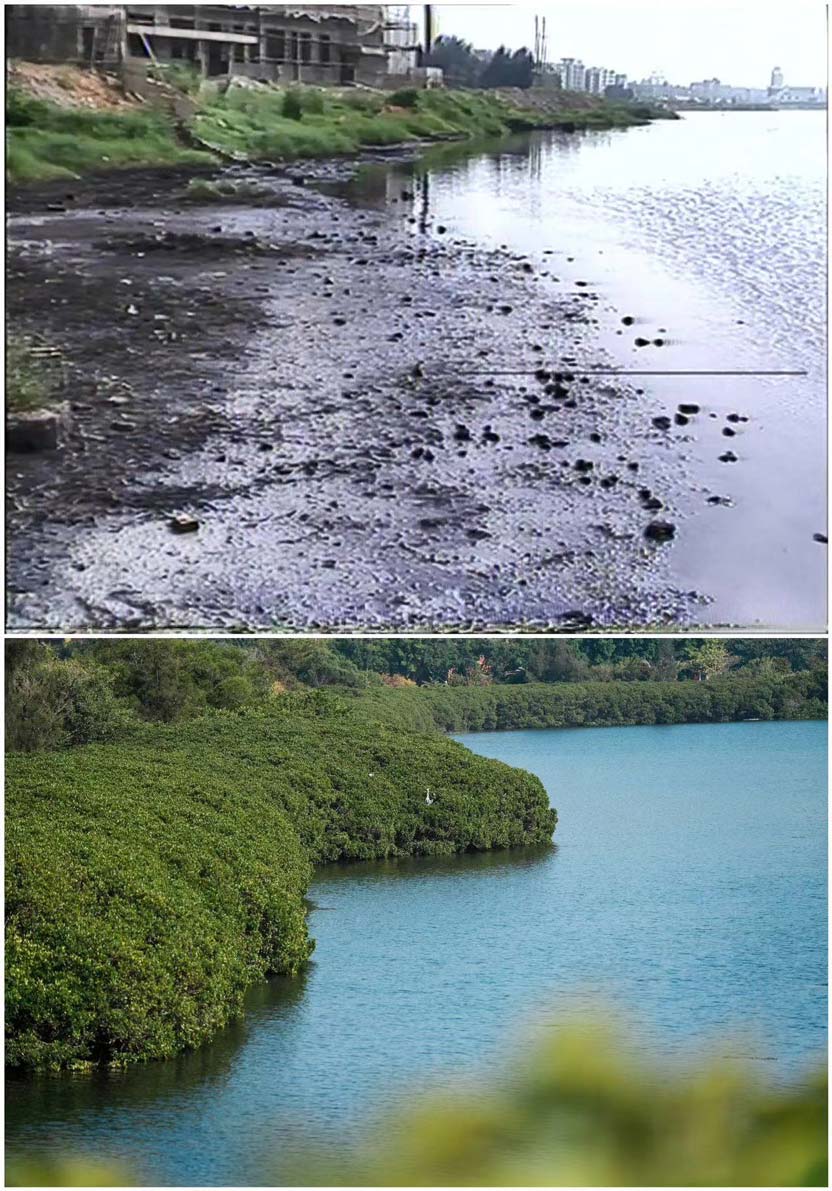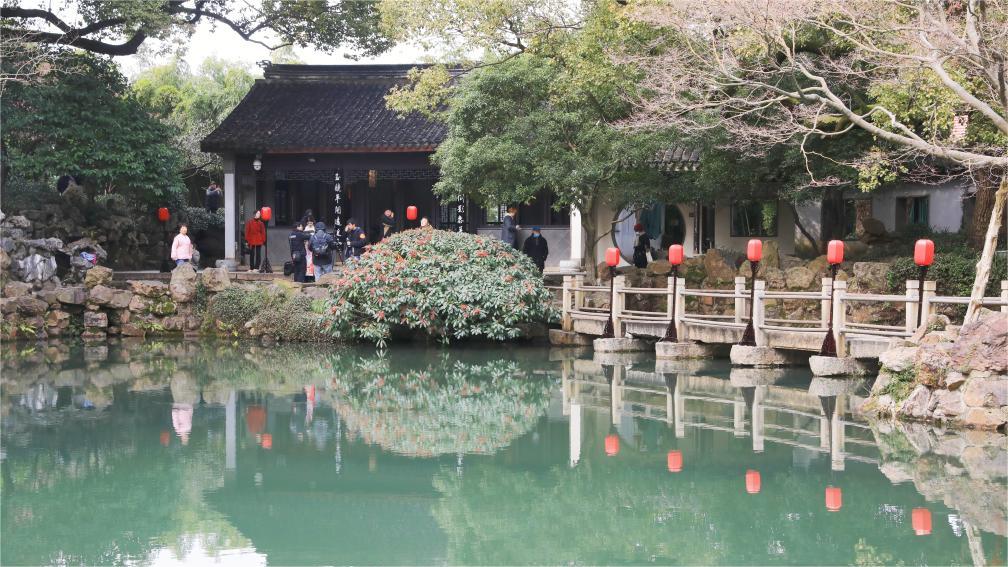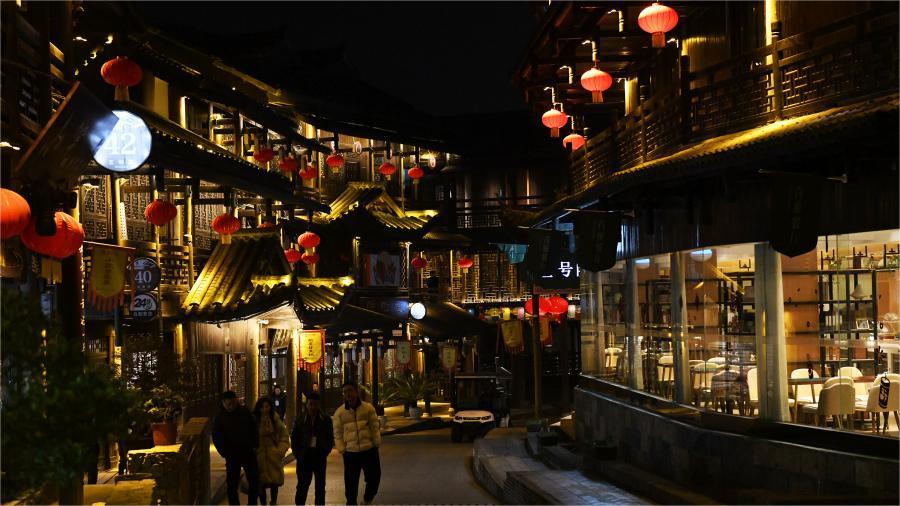Xiamen's Yundang Lake: Symbol of China's ecological civilization construction
As dawn breaks over Yundang Lake in Xiamen, southeast China's Fujian Province, the gentle chirping of birds and a delicate mist envelop the water. Along the lakeside, early risers engage in rhythmic jogging while seniors participate in morning exercises. Young artists sketch the scenic beauty at the lake's edge, their laughter echoing through the vibrant morning atmosphere. This scene epitomizes the daily tranquility of Yundang Lake, a beloved retreat for Xiamen residents seeking exercise and relaxation.
Peng Zhiwei, president of the Xiamen Bird Watching Society, frequently visits Yundang Lake. With its clear waters, year-round greenery, melodious bird sounds, and fragrant flowers, the lake has been Peng's favorite spot for bird photography since the 1990s. Through his lens, he has witnessed the awe-inspiring transformation of the lake's ecosystem.

Egrets rest near the floodgate of Yundang Lake in Xiamen, southeast China's Fujian Province. (Photo provided to People's Daily Online/Peng Zhiwei)
"Over the past few decades, the ecological environment in the lake area has significantly improved. The diversity of bird species in Yundang Lake has increased, and the egrets have grown closer to humans," he said. "Nowadays, photographers from all over the country visit Yundang Lake daily to capture the beauty of the birds."
From polluted to pristine: The restoration of Yundang Lake

Combo photo shows Yundang Lake in Xiamen, southeast China's Fujian Province, before restoration (above, file photo provided to People's Daily Online) and a view of Yundang Lake on Feb. 2, 2024 (below, photo taken by Wu Chaolan).
However, this beautiful haven was once marred by pollution, inflicting immense suffering on residents. It resembled a stagnant, foul-smelling pool, devoid not only of fish and shrimp, but also of mosquitoes.
In bygone days, Yundang Lake stood as a bustling coastal port. However, the landscape underwent a significant shift in the 1970s when people reclaimed land from the sea to increase grain production, transforming it into an inland lake. This led to a drastic reduction in the water surface area to a mere 1.6 square kilometers.
As the population and the number of factories increased, Yundang Lake faced severe water pollution. The wastewater of hundreds of thousands of residents and industrial facilities was indiscriminately discharged into the lake, resulting in a swift deterioration of water quality.
"People needed to roll up their car windows when they passed the lake to shield themselves against the unpleasant odor," said Hao Songqiao, former director of the Yundang Lake Protection Center.
Restoring Yundang Lake presented formidable challenges, given the proliferation of highly polluting factories and residential zones in the surrounding area. Various experts nationwide proposed numerous solutions, yet the abundance of options left management uncertain about the most effective course of action. The intricate difficulties underscored the complex nature of environmental protection at the lake.
The turning point arrived on March 30, 1988, when Xi Jinping, who then served as a member of the Standing Committee of the Communist Party of China Xiamen Municipal Committee and executive vice mayor of Xiamen, spearheaded a pivotal meeting on the comprehensive management of Yundang Lake. After months of research, he introduced a visionary 20-character policy in Chinese, emphasizing: "Law-based lake management, halting the discharge of untreated sewage, dredging the lake and building embankments, revitalizing the water, and beautifying the environment."
"This marked a transformative breakthrough in Yundang Lake's rejuvenation," said Zhang Yihe, a former officer who participated in the lake's restoration work. "This impactful meeting gave us confidence and direction in managing Yundang Lake, providing a strong foundation and legal support for our efforts."
In the mid-to-late 1980s, the Xiamen government implemented various measures to turn the tide and restore the lake to its former state of health under the guidance of the 20-character policy.
Halting the untreated sewage discharge was a pivotal measure in restoring Yundang Lake. Since 1988, Xiamen has closed and relocated 210 industrial enterprises around Yundang Lake, constructed high-standard sewage facilities, and implemented rain and sewage diversion in 855 neighboring areas, including completing Fujian Province’s first wastewater treatment plant in 1989.
Proactive measures extended beyond industrial and wastewater management. Since the 1980s, Yundang Lake has undergone five comprehensive dredging projects, removing approximately 5.6 million cubic meters of sediment. The extracted silt was repurposed for constructing areas like Bailuzhou Park, demonstrating a sustainable approach to waste utilization.
Among the initiatives in the 20-character policy, a particularly innovative approach involved utilizing natural tidal fluctuations as a dynamic force to enhance the lake's water quality. Since the 1980s, Yundang Lake has seen the construction of infrastructure such as sluices, using the rising tide to allow an influx of water and opening flood outlets during low tide, ensuring a continual refreshment of the lake’s water.
The effectiveness of this policy has been proven through practice. After three years of comprehensive management, Yundang Lake witnessed its initial revitalization success, achieving the goal of "basically odorless water." In 1992, a long-awaited dragon boat race was held at the lake, drawing a massive crowd that gathered along the lake banks. "The resounding cheers were not just for the competition but also a celebration of the effective management of Yundang Lake," said Zhang.

Children participate in a drawing class beside Yundang Lake in Xiamen, southeast China's Fujian Province, Feb. 1, 2024. (People's Daily Online/Wu Chaolan)
However, managing the lake requires ongoing dedication. Over the past 30 years, Xiamen has steadfastly adhered to the 20-character policy for lake management. To date, the Xiamen government has carried out five large-scale comprehensive restoration phases. After decades of dedicated effort, Yundang Lake has blossomed into a captivating urban retreat. The once troubled waters now ripple peacefully, drawing visitors to its lakeside promenade where they can marvel at the graceful dance of migratory birds.
According to data provided by the Yundang Lake Protection Center, the water quality of Yundang Lake has significantly improved, and the lake teems with diverse aquatic and bird life, making it a harmonious sanctuary in the heart of the city.
Rippling effects: The impact of Yundang Lake's revival
This transformative effort, driven by President Xi Jinping's Thought on Ecological Civilization, has not only altered the local landscape but has also sparked city-wide dedication to sustainable urban development.
"Practice has demonstrated that Yundang Lake's success serves as both a tangible test of China's ecological civilization construction and a reproducible model for water pollution control," said Zhang, noting that Xiamen, inspired by the Yundang Lake experience, is incorporating similar practices in various other locations across the city.
Just 20 kilometers away from Yundang Lake, Xinglin Bay is currently undergoing environmental restoration, leveraging lessons learned from Yundang Lake. The project aims to dredge around 3.13 million cubic meters of sediment, around four times the volume handled in the Yundang Lake ecological improvement project.
"With 790,000 cubic meters of sediment already dredged, constituting 25% of the total volume, our goal is to meet the water quality standards by July 2025," said a Xinglin Bay protection project employee, highlighting the progress made in enhancing both water quality and environmental management. "The sediment removal has not only improved water quality but has also provided a habitat for birds, a source of pride for the community."
"These projects exemplify the concept that lucid waters and lush mountains are invaluable assets, benefiting present and future generations," he said.
The ethos of green development extends from Yundang Lake to Xinglin Bay and permeates all aspects of Xiamen's economic and social development. This dedication has resulted in significant social and ecological benefits, standing as a testament to China's dedication to environmental protection and restoration.
Photos
Related Stories
- Yundang Lake's remarkable transformation: From polluted past to scenic treasure
- China's Xiamen: A successful practice of sustainable development in bay city
- Is this the World's Most Chill City?
- Xiamen takes multiple measures to promote harmony between human, sea
- Xiamen a vivid example of beautiful China
- Tulips bring color to Spring Festival at Xiamen expo garden
- In pics: A glimpse of Xiamen from Kinmen
Copyright © 2024 People's Daily Online. All Rights Reserved.









